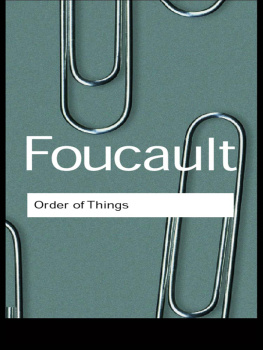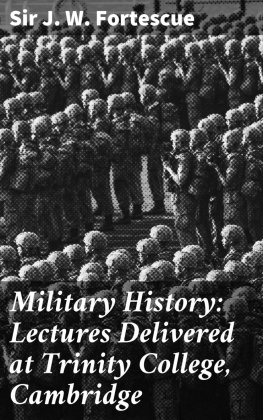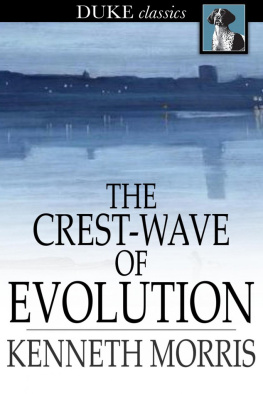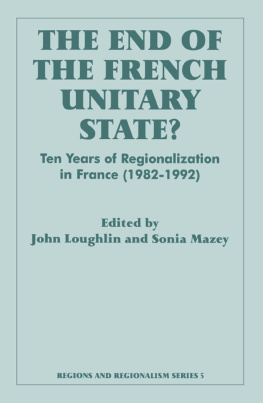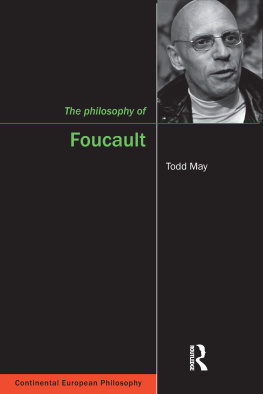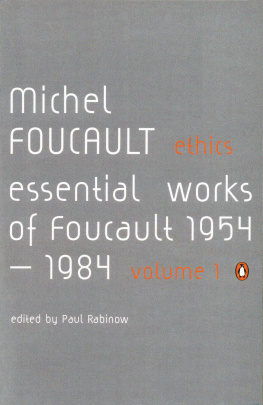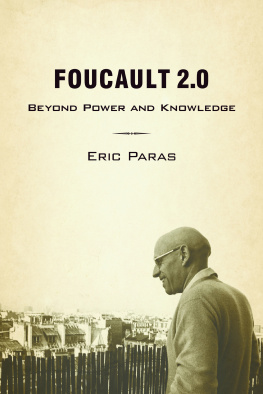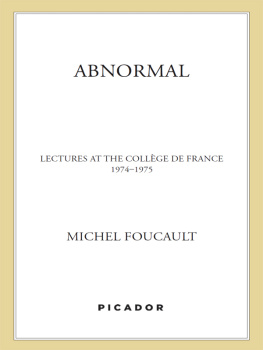MICHEL FOUCAULT TAUGHT AT the Collge de France from January 1971 until his death in June 1984 (with the exception of 1977 when he took a sabbatical year). The title of his chair was The History of Systems of Thought.
On the proposal of Jules Vuillemin, the chair was created on 30 November 1969 by the general assembly of the professors of the Collge de France and replaced that of The History of Philosophical Thought held by Jean Hyppolite until his death. The same assembly elected Michel Foucault to the new chair on 12 April 1970. He was 43 years old.
Michel Foucaults inaugural lecture was delivered on 2 December 1970. In the terminology of the Collge de France, the professors do not have students but only auditors.
Michel Foucaults courses were held every Wednesday from January to March. The huge audience made up of students, teachers, researchers and the curious, including many who came from outside France, required two amphitheaters of the Collge de France. Foucault often complained about the distance between himself and his public and of how few exchanges the course made possible. He would have liked a seminar in which real collective work could take place and made a number of attempts to bring this about. In the final years he devoted a long period to answering his auditors questions at the end of each course.
This is how Grard Petitjean, a journalist from Le Nouvel Observateur , described the atmosphere at Foucaults lectures in 1975:
When Foucault enters the amphitheater, brisk and dynamic like someone who plunges into the water, he steps over bodies to reach his chair, pushes away the cassette recorders so he can put down his papers, removes his jacket, lights a lamp and sets off at full speed. His voice is strong and effective, amplified by the loudspeakers that are the only concession to modernism in a hall that is barely lit by light spread from stucco bowls. The hall has three hundred places and there are five hundred people packed together, filling the smallest free space There is no oratorical effect. It is clear and terribly effective. There is absolutely no concession to improvisation. Foucault has twelve hours each year to explain in a public course the direction taken by his research in the year just ended. So everything is concentrated and he fills the margins like correspondents who have too much to say for the space available to them. At 19.15 Foucault stops. The students rush towards his desk; not to speak to him, but to stop their cassette recorders. There are no questions. In the pushing and shoving Foucault is alone. Foucault remarks: It should be possible to discuss what I have put forward. Sometimes, when it has not been a good lecture, it would need very little, just one question, to put everything straight. However, this question never comes. The group effect in France makes any genuine discussion impossible. And as there is no feedback, the course is theatricalized. My relationship with the people there is like that of an actor or an acrobat. And when I have finished speaking, a sensation of total solitude
Foucault approached his teaching as a researcher: explorations for a future book as well as the opening up of fields of problematization were formulated as an invitation to possible future researchers. This is why the courses at the Collge de France do not duplicate the published books. They are not sketches for the books even though both books and courses share certain themes. They have their own status. They arise from a specific discursive regime within the set of Foucaults philosophical activities. In particular they set out the program for a genealogy of knowledge/power relations, which are the terms in which he thinks of his work from the beginning of the 1970s, as opposed to the program of an archeology of discursive formations that previously orientated his work.
The course also performed a role in contemporary reality. Those who followed his courses were not only held in thrall by the narrative that unfolded week by week and seduced by the rigorous exposition, they also found a perspective on contemporary reality. Michel Foucaults art consisted in using history to cut diagonally through contemporary reality. He could speak of Nietzsche or Aristotle, of expert psychiatric opinion or the Christian pastoral, but those who attended his lectures always took from what he said a perspective on the present and contemporary events. Foucaults specific strength in his courses was the subtle interplay between learned erudition, personal commitment, and work on the event.
With their development and refinement in the 1970s, Foucaults desk was quickly invaded by cassette recorders. The coursesand some seminarshave thus been preserved.
This edition is based on the words delivered in public by Foucault. It gives a transcription of these words that is as literal as possible. We would have liked to present it as such. However, the transition from an oral to a written presentation calls for editorial intervention: at the very least it requires the introduction of punctuation and division into paragraphs. Our principle has been always to remain as close as possible to the course actually delivered.
Summaries and repetitions have been removed whenever it seemed to be absolutely necessary. Interrupted sentences have been restored and faulty constructions corrected. Suspension points indicate that the recording is inaudible. When a sentence is obscure there is a conjectural integration or an addition between square brackets. An asterisk directing the reader to the bottom of the page indicates a significant divergence between the notes used by Foucault and the words actually uttered. Quotations have been checked and references to the texts used are indicated. The critical apparatus is limited to the elucidation of obscure points, the explanation of some allusions and the clarification of critical points. To make the lectures easier to read, each lecture is preceded by a brief summary that indicates its principal articulations.
The text of the course is followed by the summary published by the Annuaire du Collge de France . Foucault usually wrote these in June, some time after the end of the course. It was an opportunity for him to pick out retrospectively the intention and objectives of the course. It constitutes the best introduction to the course.
Each volume ends with a context for which the course editors are responsible. It seeks to provide the reader with elements of the biographical, ideological, and political context, situating the course within the published work and providing indications concerning its place within the corpus used in order to facilitate understanding and to avoid misinterpretations that might arise from a neglect of the circumstances in which each course was developed and delivered.
The Government of Self and Others , the course delivered in 1983, is edited by Frdric Gros.
A new aspect of Michel Foucaults uvre is published with this edition of the Collge de France courses.
Strictly speaking it is not a matter of unpublished work, since this edition reproduces words uttered publicly by Foucault, excluding the often highly developed written material he used to support his lectures. Daniel Defert possesses Michel Foucaults notes and he is to be warmly thanked for allowing the editors to consult them.
This edition of the Collge de France courses was authorized by Michel Foucaults heirs who wanted to be able to satisfy the strong demand for their publication, in France as elsewhere, and to do this under indisputably responsible conditions. The editors have tried to be equal to the degree of confidence placed in them.


